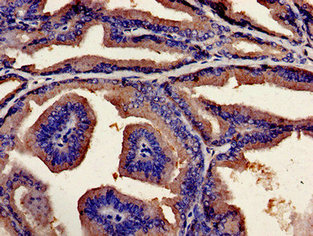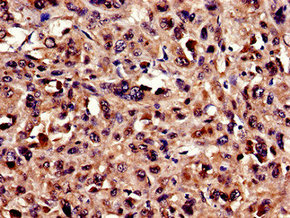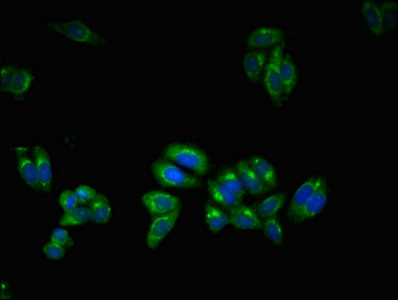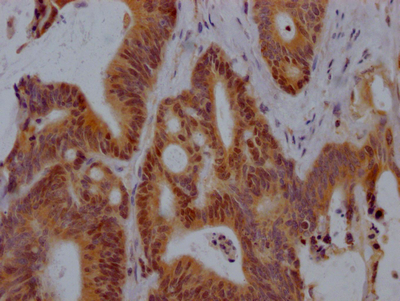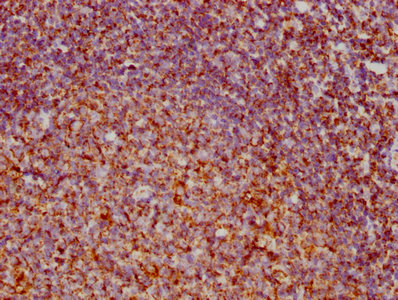UBQLN2 Antibody
-
货号:CSB-PA883393LA01HU
-
规格:¥440
-
促销:
-
图片:
-
Immunohistochemistry analysis of human prostate tissue using CSB-PA883393LA01HU at dilution of 1:100
-
Immunocytochemistry analysis of human melanoma using CSB-PA883393LA01HU at dilution of 1:100
-
Immunofluorescent analysis of HepG2 cells using CSB-PA883393LA01HU at dilution of 1:100 and Alexa Fluor 488-congugated AffiniPure Goat Anti-Rabbit IgG(H+L)
-
-
其他:
产品详情
-
产品名称:Rabbit anti-Homo sapiens (Human) UBQLN2 Polyclonal antibody
-
Uniprot No.:Q9UHD9
-
基因名:
-
别名:UBQLN2 antibody; N4BP4 antibody; PLIC2 antibody; HRIHFB2157Ubiquilin-2 antibody; Chap1 antibody; DSK2 homolog antibody; Protein linking IAP with cytoskeleton 2 antibody; PLIC-2 antibody; hPLIC-2 antibody; Ubiquitin-like product Chap1/Dsk2 antibody
-
宿主:Rabbit
-
反应种属:Human
-
免疫原:Recombinant Human Ubiquilin-2 protein (473-542AA)
-
免疫原种属:Homo sapiens (Human)
-
标记方式:Non-conjugated
本页面中的产品,UBQLN2 Antibody (CSB-PA883393LA01HU),的标记方式是Non-conjugated。对于UBQLN2 Antibody,我们还提供其他标记。见下表:
-
克隆类型:Polyclonal
-
抗体亚型:IgG
-
纯化方式:>95%, Protein G purified
-
浓度:It differs from different batches. Please contact us to confirm it.
-
保存缓冲液:Preservative: 0.03% Proclin 300
Constituents: 50% Glycerol, 0.01M PBS, pH 7.4 -
产品提供形式:Liquid
-
应用范围:ELISA, IHC, IF
-
推荐稀释比:
Application Recommended Dilution IHC 1:20-1:200 IF 1:50-1:200 -
Protocols:
-
储存条件:Upon receipt, store at -20°C or -80°C. Avoid repeated freeze.
-
货期:Basically, we can dispatch the products out in 1-3 working days after receiving your orders. Delivery time maybe differs from different purchasing way or location, please kindly consult your local distributors for specific delivery time.
相关产品
靶点详情
-
功能:Plays an important role in the regulation of different protein degradation mechanisms and pathways including ubiquitin-proteasome system (UPS), autophagy and the endoplasmic reticulum-associated protein degradation (ERAD) pathway. Mediates the proteasomal targeting of misfolded or accumulated proteins for degradation by binding (via UBA domain) to their polyubiquitin chains and by interacting (via ubiquitin-like domain) with the subunits of the proteasome. Plays a role in the ERAD pathway via its interaction with ER-localized proteins FAF2/UBXD8 and HERPUD1 and may form a link between the polyubiquitinated ERAD substrates and the proteasome. Involved in the regulation of macroautophagy and autophagosome formation; required for maturation of autophagy-related protein LC3 from the cytosolic form LC3-I to the membrane-bound form LC3-II and may assist in the maturation of autophagosomes to autolysosomes by mediating autophagosome-lysosome fusion. Negatively regulates the endocytosis of GPCR receptors: AVPR2 and ADRB2, by specifically reducing the rate at which receptor-arrestin complexes concentrate in clathrin-coated pits (CCPs).
-
基因功能参考文献:
- The genome of Drosophila contains a single UBQLN homolog (dUbqn) that shows high similarity to UBQLN1 and UBQLN2; therefore, the fly is a useful model for characterizing the role of UBQLN in vivo in neurological disorders affecting locomotion and learning abilities. PMID: 29247619
- Its PXX domain missense mutations linked to amyotrophic lateral sclerosis and atypical hereditary spastic paraplegia phenotype through defective HSP70-mediated proteolysis. PMID: 28716533
- Its mutation is a cause of amyotrophic lateral sclerosis in New Zealand. PMID: 27480424
- Ubiquilins are a family of chaperones for cytosolically exposed transmembrane domains and use ubiquitin to triage clients for degradation via coordinated intra- and intermolecular interactions. PMID: 27345149
- We analyzed mutations in the UBQLN2 gene in a Chinese cohort with sporadic ALS (sALS). A novel missense mutation was detected in one sALS patient. The p.M392V mutation substitutes a highly conserved residue, has not been reported in the population databases, and previously, at the same residue, a missense mutation p.M392I was detected in two Turkey ALS patients and was considered to be pathogenic. PMID: 28125704
- Frontotemporal dementia -linked mutations in gene ubiquilin 2 encoding autophagy adaptor proteins , indicate that impaired autophagy might cause Frontotemporal dementia. PMID: 27166223
- excess UBQLN2 is toxic rather than protective to neurons and that uncontrolled enhancement of UBQLN2 function is involved in UBQLN2 pathogenesis PMID: 27456931
- Ubiquilin-2 immunostaining - a new marker as a diagnostic supplement in urine cytology? PMID: 27168037
- UBQLN2 is specifically expressed in the urine of urothelial carcinoma patients. PMID: 26303000
- Results showed that UBQLN2 is selectively recruited to nuclear inclusions in Huntington's disease but not spinocerebellar ataxia type 3 PMID: 26141599
- These findings provide a molecular basis for the development of ALS/FTD-associated proteinopathy and establish novel therapeutic targets for ALS. PMID: 26944018
- Mutations in UBQLN2 gene cause dominant inheritance of amyotrophic lateral sclerosis due to Defective Proteasome Delivery. PMID: 26075709
- UBQLN2 may be a new molecular target for chemotherapeutics and a useful clinicopathological marker in human osteosarcoma. PMID: 25672654
- ALS-linked mutations in ubiquilin-2 or hnRNPA1 reduce interaction between ubiquilin-2 and hnRNPA1 PMID: 25616961
- A single putative mutation of UBQLN2 in a cohort of patients with front temporal lobar degeneration was found. PMID: 25179229
- Data indicate cognitive deficits in mutant ubiquilin 2 protein UBQLN2P497H transgenic mice. PMID: 25246588
- Causative mutation in the UBQLN2 gene is rare in Korean patients with either familial or sporadic ALS. PMID: 24684794
- As ubiquilin-2-positive inclusions are identified in brain, this mutant peptide predisposes to protein misfolding and accumulation. PMID: 24771548
- The P506S mutation in UBQLN2 can affect both males and females with frontotemporal dementia/amyotrophic lateral sclerosis (FTD/ALS). PMID: 23944734
- no evidence for involvement of ubiquilin 2 in tau pathology PMID: 24086754
- The dtat of study suggest that UBQLN2 is generally involved in the pathogenesis of ALS. PMID: 24085347
- Its mutations are not frequent cause of amyotrophic lateral sclerosis in Ireland. PMID: 23973441
- results were confirmed by similar findings for ubiquilin-1 and -2 in human brain tissue sections, where accumulation was observed in huntingtin inclusions PMID: 23774650
- Genetic variations in UBQLN2 in a predominantly Flanders-Belgian cohort of frontotemporal lobar degeneration patients are extremely rare. PMID: 23312802
- Its mutations related to ALS/FTLD are extremely rare in French FTLD and FTLD-ALS patients. PMID: 23582661
- No causative mutations within the PXX domain of the UBQLN2 gene are found in familial frontotemoral dementia patients. PMID: 22729385
- data support the role of the UBQLN2 gene in the pathogenesis of FALS, being conversely a rare genetic cause in SALS even when complicated by FTD. PMID: 23138764
- This study reported 3 novel UBQLN2 mutations, accounting for 1.2% (2/161) ALS and 2.2% (1/45) FTD patients, including a patient with pure FTD. PMID: 22892309
- A novel missense UBQLN2 mutation (c.1460C>T, p.T487I) was identified in 2 apparently unrelated multigenerational amyotrophic lateral sclerosis families with no evidence of frontotemporal dementia. This mutation segregated with the disease. PMID: 22717235
- The results of this study support support a causative role of the UBQLN2 gene in the pathogenesis of ALS and suggest that UBQLN2 mutations are rare in the French and French-Canadian population. PMID: 22560112
- The results of this study suggested that UBQLN2 was not found to be a cause of familial ALS in the Netherlands. PMID: 22676852
- Found a pathophysiological link between C9ORF72 expansions and ubiquilin-2 (UBQLN) proteins in amyotrophic lateral sclerosis and frontotemporal lobar degeneration that is associated with a highly characteristic pattern of UBQLN pathology. PMID: 22426854
- The results of this study suggested that UBQLN2 gene mutations are rare in French amyotrophic lateral sclerosis. PMID: 22169395
- findings link abnormalities in ubiquilin 2 to defects in the protein degradation pathway, abnormal protein aggregation and neurodegeneration, indicating a common pathogenic mechanism that can be exploited for therapeutic intervention PMID: 21857683
- solution structure of the ubl domain of hPLIC-2 PMID: 11827521
- hPLIC-2 interferes with the ubiquitin-mediated proteolysis of p53 and interacts with proteasomes PMID: 12972570
- Ubiquilin is capable of forming dimers. Dimerization requires the central region of ubiquilin, but not its UBL or the UBA domains. Monomeric ubiquilin is likely to be the active form that is involved in binding presenilin proteins. PMID: 16813565
- hHR23a and hPLIC2 interact via UBL/UBA domain interactions PMID: 17098253
- Ubiquitin-like protein PLIC-2 is identified as a negative regulator of G protein-coupled receptor endocytosis. PMID: 18199683
- siRNA-mediated UBQLN2 depletion made cells more susceptible to starvation-induced cell death. UBQLN2 regulates cell survival during starvation. PMID: 19148225
显示更多
收起更多
-
相关疾病:Amyotrophic lateral sclerosis 15, with or without frontotemporal dementia (ALS15)
-
亚细胞定位:Cytoplasm. Nucleus. Membrane. Cytoplasmic vesicle, autophagosome.
-
数据库链接:
HGNC: 12509
OMIM: 300264
KEGG: hsa:29978
STRING: 9606.ENSP00000345195
UniGene: Hs.179309
Most popular with customers
-
-
-
-
-
-
-
-
VDAC1 Recombinant Monoclonal Antibody
Applications: ELISA, WB, IHC
Species Reactivity: Human, Mouse, Rat


